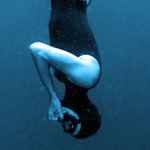 When people talk about freediving techniques, they are normally referring to breath hold techniques. These are methods for improving the amount of time you can hold your breath for. Remember, everyone can hold their breath for ages when they are sat relaxed on the sofa – however it’s a different story when you’re out at sea in difficult conditions.
When people talk about freediving techniques, they are normally referring to breath hold techniques. These are methods for improving the amount of time you can hold your breath for. Remember, everyone can hold their breath for ages when they are sat relaxed on the sofa – however it’s a different story when you’re out at sea in difficult conditions.
A simple technique to be able to hold your breath for longer is to relax between dives. This should be a minimum of at least 2 minutes. This period is called ‘the breathe up’. During this period you want to relax yourself as much as is possible. Or as much as you can while you’re about to risk your life for a fish. Focus on your breathing and slowing it down along with your heart rate. Think warm happy thoughts, of warm safe places and allow yourself to drift off. Breathe normally until the very last moment before your dive.
Then take 3 big breaths. Breathe in from your belly first and then finish it off via your chest. Take about 4 seconds to do this and then slowly breathe out for 10 seconds. I whistle out blowing on my teeth a bit like a snake to help me focus on everything. Your third and final breath needs to be your biggest possible and you keep every ounce of it stored in your lungs.
From there you descend into the eerie depths of your chosen hunting ground. The first thing you need to deal with is the excruciating pain in your ears. It kind of feels like someone is stabbing you with a knitting needle – however, rest assured it’s 100% normal and immediately remedied by something called ‘equalising’.
The need to ‘equalise’ is caused by an ever increasing amount of pressure from the ocean on top of you. You just need to make sure the pressure inside your ears matches the pressure outside your ears. This is done simply by just holding your nose closed and blowing – that’s it. Some virgin ears may struggle to equalise for their first couple of dives. Again this is completely normal and the last thing you want to be doing is forcing it. So don’t keep going if you can’t equalise, and don’t blow so hard you feel like you are about to pass out. Just stay within your limits, have fun and keep at it.
While you are bottom side it won’t be long before you start to hyperventilate and your chest will spasm in what feels like an urgent need for oxygen. While this is not entirely accurate, it’s not too far off. The spasm is actually your body wanting to get rid of the toxins caused by holding a breath of air in your lungs for too long, not the actual need for fresh oxygen. What’s scarier is that there are no actual warning signs that you are about to pass out from lack of oxygen. You don’t see black around the side of vision or start to go woozy, you just black out!
That said, it’s extremely rare that people pass out but it’s a great excuse to always dive in twos. As a rough indicator I have been told that you have about twice as long as your first hyperventilation to the point where you really desperately need air.
Always stay within your limits, dive in pairs and look after each other.
